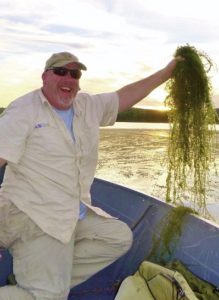Regional biologist gives opinion
by Nate Gray
Regional biologist, Maine Department of Marine Resources
Frank (Richards) and I went out in his boat to look at a floating island of weeds. What I keyed out was elodea Canadensis. Is it possible I was mistaken? Unlikely, as I’ve looked at gobs of the stuff but still possible. Given the level of angst about the “weed” issue in Webber I’m going to take another look at some different spots. Many of the ponds in the mid-Maine basin are experiencing “better” water quality this year and there are multiple reasons for this. Very low rainfall (drought) and higher than average atmospheric temps (and by default that includes water temps). This can set up a dynamic in ponds that strongly stratifies the water. The thermocline becomes very pronounced and through this effect limits the amount of phospherous available. We’ve had very few storm events this summer.

Nate Gray, regional biologist with the Maine Department of Marine Resources, displays Elodea Canadensis, also known as American pondweed, he plucked out of Webber Pond recently. File photo
It takes a good blow to disrupt the thermocline and allow the phospherous trapped in the anoxic zone to mix with the water above it. Make no mistake, this will happen at one point or another. A good strong wind will drive the water to the southwest shore (assuming a Nor’easter here). All that water will have to go someplace – down. The further into the season we get the lower the pond surface temps will be thereby “weakening” the thermocline. Once that lens is broken there is a lot of phospherous available to mix in the upper water column. Once the phospherous gets there…..boom! Phytoplankton bloom!. The pond goes green. Meanwhile this thermocline/water clarity issue will in turn favor greater light penetration. This greater light penetration will induce more plant growth. In some cases explosive growth. Especially in the shallower reaches of the pond, i.e. the north end. The patch that Frank took me out to was about 2-3 acres of dense growth. So, I think another visit to the pond is in order.
Responsible journalism is hard work!
It is also expensive!
If you enjoy reading The Town Line and the good news we bring you each week, would you consider a donation to help us continue the work we’re doing?
The Town Line is a 501(c)(3) nonprofit private foundation, and all donations are tax deductible under the Internal Revenue Service code.
To help, please visit our online donation page or mail a check payable to The Town Line, PO Box 89, South China, ME 04358. Your contribution is appreciated!


Leave a Reply
Want to join the discussion?Feel free to contribute!